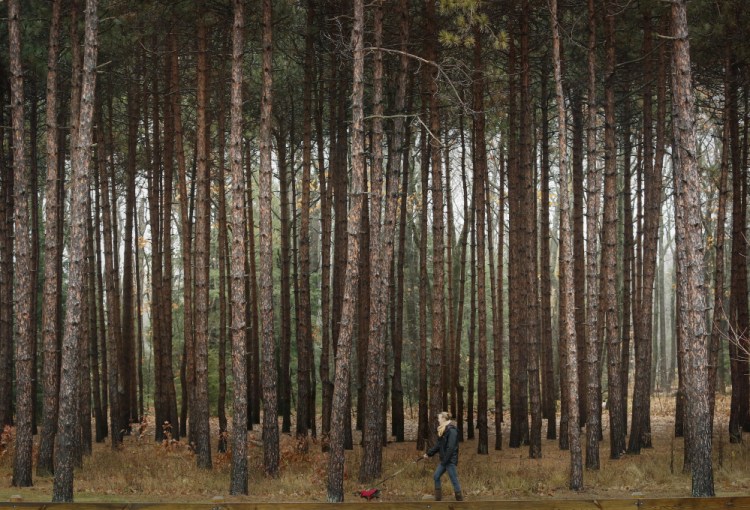Portland officials postponed a neighborhood meeting about a proposed retention pond in Mayor Baxter Woods after residents questioned the city’s legal right to cut trees in the nearly 30-acre nature preserve.
City Hall Communications Director Jessica Grondin said Tuesday that the city attorney is reviewing the 70-year-old deed for the popular park donated by former Maine Gov. Percival Baxter, which prohibits cutting any trees unless they have fallen or pose a safety hazard. Once that review is finished, the city will reschedule the neighborhood meeting originally scheduled for Thursday evening at Deering High School.
“We thought it was premature to go out with a public meeting without first knowing the findings of our corporation counsel,” Grondin said.
The city wants to build a stormwater retention pond in the southeast corner of the park that would reduce water pollution in Casco Bay.
Currently, stormwater drains into a dry basin built in the park in 1986, which connects to the city’s combined sewer and stormwater outfall drains. During heavy rains, the city’s treatment system is overwhelmed by the combined flow of stormwater and sewage and those drains discharge untreated waste directly into Back Cove. The new system would hold stormwater in the pond until the treatment plant can handle it. The city is required to reduce the overflows as part of a 1993 consent decree with the U.S. Environmental Protection Agency.

Mayor Baxter Woods was donated to the city in 1946 by Percival Proctor Baxter, the 53rd governor of Maine, shown in a handout photo, in honor of his father.
But the project, which Grondin estimated would cost at least $175,000, has raised concerns from a couple of abutters who worry about the project’s impact on their neighborhood.
Hartley Street resident Michael Charek said in a July 17 letter to the city that neighbors support the project’s goal of reducing water pollution, but are concerned about a loss of “visual and acoustic screening by the existing vegetation, the possible increase in the chance of flooding in our basement, and the addition of prime new mosquito breeding territory.”
He continued: “Beyond the concerns of individual property owners, there seems to have been no public planning process leading up to this point, and the project seems to violate the deed of trust that established Baxter Woods Park in the first place.”

The 29.5-acre parcel bordered by Forest Avenue, Hartley Street and Stevens Avenue was owned by former Portland Mayor James Phinney Baxter from 1882 to 1921. After his death, management of the land was given over to his youngest son, Percival Baxter, who 25 years later as Maine’s governor donated it to the city in honor of his father.
That gift, however, came with restrictions. According to the deed, the land is to be kept in its natural state as a sanctuary for wild birds and “any trees that shall fall or that may become a menace to life may be removed, but no other trees therein may be taken down.”
Similar so-called “forever wild” restrictions govern Baxter State Park, a 200,000-acre tract in northern Maine that includes Mount Katahdin, which was donated to the people of Maine by former Gov. Baxter. The strict rules about activities at the state park have been the source of conflicts concerning everything from snowmobile access to celebrations on the peak of Katahdin by hikers finishing the Appalachian Trail.
At the park in Portland, city officials had planned to remove a couple dozen non-native Norway maple trees and clear invasive plants from the work site, city arborist Jeff Tarling has previously said. Tarling had noted that the project was unanimously approved by the city’s Land Bank Commission, a citizen panel charged with identifying and protecting open spaces.
Grondin said she doesn’t believe the deed restrictions came up previously, mainly because the city had already built a dry basin at the site, and the new work would return the site to a more natural state.
“The project is to correct the work that has already been done,” she said.
The project, originally scheduled to get underway in September, would need the approval of the City Council.
Send questions/comments to the editors.




